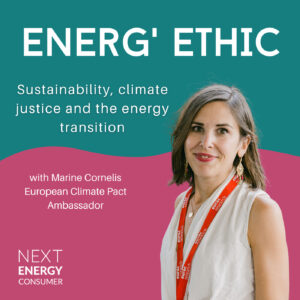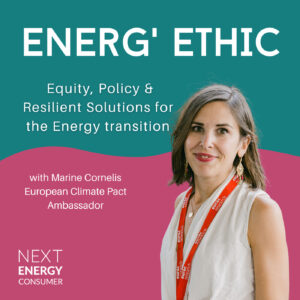In 2020, I became a mom and an EU Climate Pact Ambassador. Two titles, two roles, and one overwhelming sense of responsibility. I don’t know which sharpened my sense of urgency more, but both have profoundly shaped the way I think about equity, justice, and what it means to build a better world.
Being reappointed as an Ambassador comes at a critical moment. Climate equity isn’t a buzzword or a technical fix; it’s a moral imperative. It’s about fairness, about making policies that serve everyone—not just the lucky few. But it’s also about asking hard questions and sitting with the discomfort they bring:
- Are we addressing the right issues?
- Are we achieving enough?
- Are we using the right language?
- Are we building enough trust?
- Are we leaving people behind?
- Are we creating a legacy we can be proud of?
Honestly? I think we could roll up our sleeves a lot higher.
The Reality We’re Facing
Every winter, millions across Europe can’t afford to heat their homes. Every summer, heat waves kill thousands. These aren’t isolated issues—they’re systemic failures. And while temporary fixes might ease the pain for now, they won’t stand the test of time.
Equity in the climate transition is about more than just affordability. It’s about control, ownership, and fairness. It’s about asking not just who’s benefiting but who’s being left behind.
This work can feel overwhelming, but what keeps me going is the belief that solutions are possible. We just need to get the fundamentals right.
What We Need Now
- Listen and involve people directly in policymaking
Policies made in isolation don’t work. The people most affected by the climate transition deserve a seat at the table. Civil society isn’t a box to check—it’s the heartbeat of progress. - Hold ourselves accountable
Passing laws is easy compared to making them matter. We need to make sure policies reach and protect those who need them most. And that means measuring impact, not just intentions. - Redefine energy equity
Affordability is essential, but energy equity goes further. It’s about who gets to make decisions, who owns the systems, and whether the benefits of the transition are being shared fairly. - Look for practical inspiration
There are people and communities making it work, even in the face of daunting challenges. Let’s amplify their stories, learn from them, and stop reinventing the wheel. (Need inspiration? My Energ’Ethic podcast is a great place to start.)
The Work Ahead
The climate transition feels like climbing an unstable rope. Some days, it’s exhausting. Other days, the climb feels impossible. But here’s the thing: we’re climbing it together.
As an Ambassador, my commitment is to keep asking uncomfortable questions, amplifying voices that aren’t being heard, and working for solutions that serve everyone—not just those with power and privilege.
This is our collective journey toward resilience, and it’s far from over. So, let’s ask ourselves: are we leaving anyone behind? And if the answer is yes, what are we doing about it?
It’s time to keep rolling up our sleeves.
What are your thoughts on energy equity? Let’s keep this conversation going.



